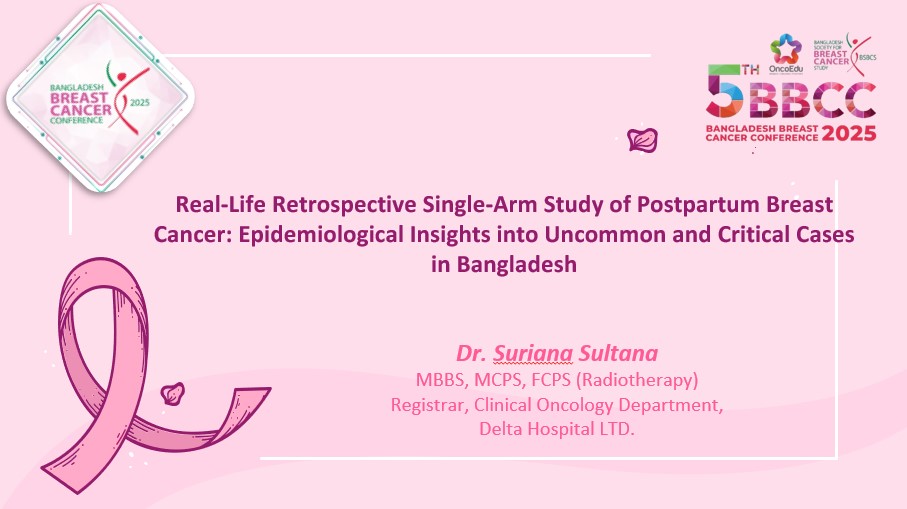Real-Life Retrospective Single-Arm Study of Postpartum Breast Cancer: Epidemiological Insights into Uncommon and Critical Cases in Bangladesh
Authors: Dr. Naheed Rukhsana , Dr. Suriana Sultana
Institution: Delta Hospital Limited, Mirpur 1, Dhaka
Introduction
Postpartum breast cancer (PPBC) is a largely unknown subtype of breast cancer, with few research investigating its potentially inferior prognosis. Even when age and the degree of the disease are taken into consideration, patients who receive a breast cancer diagnosis during the postpartum phase may have poorer results.
Methods
Here we have taken 20 post-partum breast cancer patients who were taking treatment from the very beginning in a single center from last 1 year.
Results
Among the 20 patients included in this study, 50% were diagnosed with triple-negative breast cancer (TNBC), 30% with estrogen receptor (ER)/progesterone receptor (PR)-positive breast cancer, 14.8% with ER/PR-negative breast cancer, and 5% with Triple Positive Breast Cancer. Moreover 10% of the patients had disease progression during their treatment. Additionally, 20% of the patients found with metastatic disease. Here we have found 50% of the patients who were misdiagnosed by FNAC which later lead to advanced stage disease progression. All participants were under 40 years of age where the median age is 32 years with the majority residing in rural areas. Along with that we have seen more aggressive state of the disease in the younger patients. The age of their youngest child was less than 2 years. Most patients were diagnosed at advanced stage of disease, contributing to the severity and complexity of their cases.
Conclusion
This preliminary investigation suggests that women diagnosed with breast cancer during the postpartum period tend to experience poorer outcomes. Specifically, the diagnosis of postpartum breast cancer (PPBC) within the first two years after childbirth is linked to an elevated risk of metastasis. It is observed in both estrogens receptor-positive and estrogen receptor-negative cases, with the risk continuing to be significant in estrogen receptor-positive instances. Overall, the findings indicate that a postpartum breast cancer diagnosis serves as negative prognostic indicator. Our main focus is to create awareness among the postpartum women (Specially lactating mothers) periodical screening is essential for early detection. Any breast lump in postpartum period must be evaluated by core biopsy. Further studies with extended follow-up and larger sample sizes are needed to validate these results.
